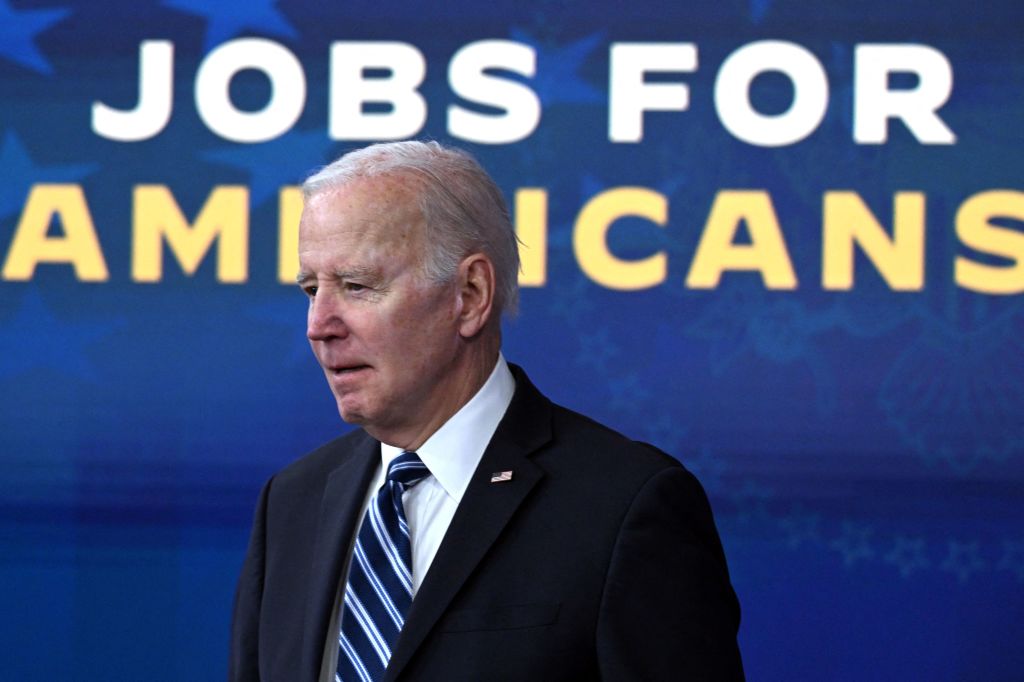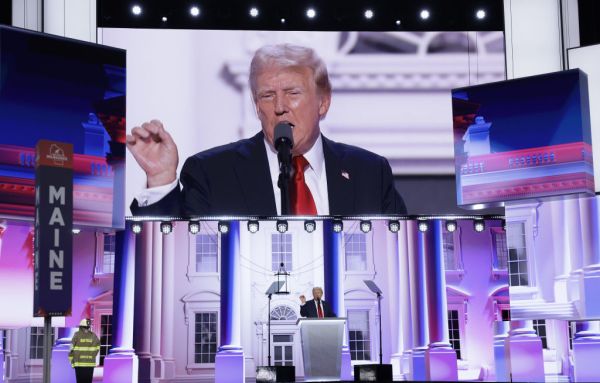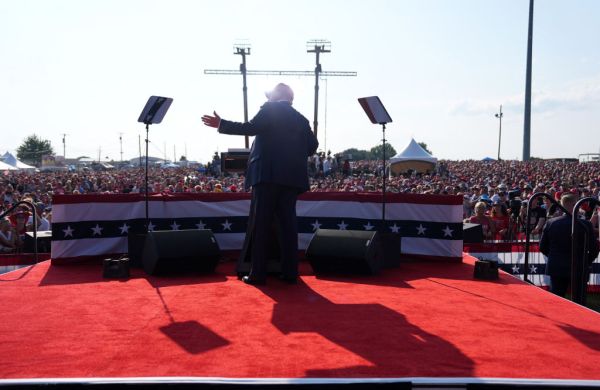Happy Monday! We are devastated to report that new photographic evidence emerged in recent days that could throw Billy Mitchell’s July 2007 Donkey Kong score of 1,050,200 points into question. How could you use an illicitly modified joystick, Billy? Children looked up to you.
Quick Hits: Today’s Top Stories
- Defense Secretary Lloyd Austin confirmed Saturday an F-22 fighter jet shot down the Chinese surveillance balloon—which entered U.S. airspace last week—over U.S. territorial waters off the South Carolina coast. The Pentagon is now working to recover the remnants of the balloon, hoping to examine them for new intelligence on Chinese equipment. The Chinese government criticized the Biden administration for shooting down what the CCP claimed was a “civilian weather balloon” that had been blown off course, arguing the United States’ response was an “obvious overreaction.” Secretary of State Antony Blinken indefinitely postponed his upcoming trip to Beijing for a bilateral meeting due to what the State Department labeled “an irresponsible act and a clear violation of U.S. sovereignty and international law.” Some Republicans knocked the White House for waiting several days to shoot down the balloon, while President Joe Biden told reporters Saturday he ordered the Pentagon on Wednesday to shoot it down “as soon as possible.” The administration, he said, waited until it was over water to avoid any injury from falling debris.
- The Bureau of Labor Statistics reported Friday that U.S. employers added 517,000 jobs in January, up from 260,000 in December and well above economists’ expectations. The unemployment rate ticked down from 3.5 percent to 3.4 percent—the lowest level in 53 years—as the labor force participation rate remained relatively unchanged at 62.4 percent. Average hourly earnings—a key measure for hints on inflation—were up 4.4 percent year-over-year, slowing slightly from December’s 4.6 percent annual rate.
- Hundreds of people were killed in southeast Turkey and Syria on Monday after a 7.8-magnitude earthquake and several aftershocks struck the region, toppling buildings and forcing residents to flee their homes. The casualty count is expected to rise as recovery efforts get underway.
- The Defense Department announced a new $2.1 billion security assistance package for Ukraine on Friday, tapping into previously approved congressional aid to send Ukraine a new longer-range bomb, as well as additional HIMARS ammunition and artillery rounds, heavy machine guns, Mine Resistant Ambush Protected (MRAP) vehicles, Javelin anti-armor systems, Claymore anti-personnel munitions, and more. The United States has now sent Ukraine nearly $30 billion in military aid since Russia’s invasion last year.
- The Pentagon estimates roughly 180,000 Russian troops have been killed or wounded in Ukraine since the Kremlin launched its invasion last year, and that number will likely increase as Russian forces reportedly prepare for an offensive on five fronts in the coming weeks. Any such offensive would focus on the embattled city of Bakhmut in eastern Ukraine, where an American aid worker, Pete Reed, was killed Thursday while trying to evacuate civilians.
- Saad Maan, spokesman for the Iraqi interior ministry, confirmed Friday that 22-year-old YouTuber Tiba Ali was killed by her father in Diwaniyah, Iraq, reportedly in retaliation for her lifestyle in Istanbul, where she lived. Dozens of demonstrators gathered to protest what they called an “honor killing” enabled by the Iraqi penal code.
- Emily Seidel, CEO of the Koch-backed Americans For Prosperity PAC, issued a memo Sunday indicating the conservative advocacy organization will unleash millions of dollars in campaign spending to defeat Donald Trump in the upcoming Republican presidential primary. “The Republican Party is nominating bad candidates who are advocating for things that go against core American principles,” the memo reads. “The American people have shown that they’re ready to move on, and so AFP will help them do that.” The Koch network had stayed out of GOP presidential primaries in recent years.
- The Working Families Party announced Friday that freshman Democratic Rep. Delia Ramirez of Illinois will give their response to President Joe Biden’s State of the Union Tuesday. The small progressive party has offered responses to the annual address in previous years, including from high-profile Democratic representatives like Rep. Rashida Tlaib of Michigan and Rep. Jamaal Bowman of New York.
An ‘Anyone’s Guess’ Economic Outlook

The Labor Department reported Friday the unemployment rate hit 3.4 percent in January for the first time since May 1969, the month The Who released the rock opera Tommy. The plunging joblessness rate was surely attributable, at least in part, to the rise in pinball wizards at the time.
But in a classic case of good news potentially being bad news, that strong number could actually increase our odds of recession if it leads the Federal Reserve to conclude additional interest-rate hikes are necessary. Chalk it up to a weird economic moment doing its best to mess with economists’ predictions.
Employers added a blazing 517,000 jobs in January, and though seasonal factors are likely warping that number a bit, it’s still an unexpectedly strong result that breaks a five-month streak of slowing job gains. The acceleration could worry Fed officials relying on a slack jobs market to aid cooling inflation—but in a positive sign for the central bank, annual wage growth continued its downward trajectory last month. Toss in falling consumer spending, a near-record number of job openings, and a waning housing market, and you’ll start to see why recession predictions are all over the map.
The Federal Reserve, for one, seems to have concluded the wild ups and downs of the pandemic are over. “COVID is no longer playing an important role in our economy,” Fed Chair Jerome Powell said Wednesday after the central bank announced a 25-basis-point hike that represented a sharp drop from the 50- and 75-basis-point hikes of last year. But COVID-19’s legacy lives on, and Powell highlighted again the Fed’s focus on creating some slack in the job market to sustain the recent trend toward price stability. Inflation slowed to 5 percent year-over-year in December, but Powell noted Wednesday falling goods and gas prices contributed the most to that figure—in his view, a temporary relief largely owed to unsnarling supply chains.
Inflation in the services sector, meanwhile, is still on the way up, and about twice the Fed’s target rate of 2 percent. Because services—think restaurants, healthcare, hotels—are so labor intensive, Powell won’t be confident inflation is on the outs until he sees signs the job market is cooling. “My own view would be that you’re not going to have a sustainable return to 2 percent inflation in that sector without a better balance in the labor market,” he said Wednesday.
With that aim in mind, Friday’s news likely had Powell hot under the collar. Though most of the gains represent a return to the pre-pandemic normal rather than an enormous spike in net employment, U.S. employers filled more than 12 million positions over the past two years alone. The United States economy added a record 7.1 million jobs in 2021. The pace had slowed toward the end of the year, but Friday’s report revised up December’s estimated job gains by 71,000. Beneath the expectation-exploding headline number of 517,000 new jobs, January also saw solid growth in previously weaker sectors. Construction, which has slowed sharply as rising interest rates discouraged home building, added 25,000 jobs, while the healthcare industry added 58,000.
January job reports are always weird, partly because data collectors try to adjust for post-holiday layoffs in sectors that staff up to handle the holidays and then lay those people off in January. Without the data adjustments, every January would look like an abrupt recession, but the adjustment can also mean a merely “lower than usual” January layoff tally shows up as “insanely good hiring!” Restaurants and other hospitality sector businesses have been struggling to find workers, so this year’s January data may be a reflection of employers holding on to those they found. Still, however you slice it, January’s report reflects a still-strong jobs market.
Last week’s economic tea leaves did include some comfort for Powell and the central bank gang, though. About 35,000 of the 74,000 new jobs reported in government, for instance, are simply California university workers returning from a strike. Perhaps most significantly, wage growth continued slowing in January. Average hourly pay rose 0.3 percent month-over-month in January, down from December’s 0.4 percent. That trend quiets fears of rising wages forcing rising prices, producing an inflationary wage-price spiral.
Powell has been predicting for months that it will take some job market “pain” to bring down inflation, but this jobs report seems to defy that wisdom. “Like $20 bills on the sidewalk and free lunches, falling inflation paired with falling unemployment is the stuff of economics fiction,” wrote Julia Pollak, chief economist at ZipRecruiter. “It’s almost as though we’re in a world with no tradeoffs, where the normal discordant tensions in the Fed’s dual mandate have magically resolved into harmony.”
The housing market has also cooled from its frenetic peak as interest rates rise, though it’s stabilized recently. According to the National Association of Realtors, existing home sales continued an eleven month retreat in December, declining 1.5 percent, but pending home sales posted 2.5 percent growth, the first increase since May. Purchase applications jumped 25 percent in mid-January and the 30-year fixed rate mortgage rate has slipped to 6.09 percent, down nearly a full point from the November peak. Overall, existing-home sales fell nearly 18 percent in 2022 compared to 2021.
Meanwhile, the fourth quarter’s gross domestic product report showed 2.9 percent growth—slower than the third quarter’s 3.2 percent but still solid—and could disguise underlying weakness. Exports and imports both fell in the fourth quarter, and consumer spending dropped off toward the end of the year—contracting 0.2 percent month-over-month in November and 0.3 percent in December. Also that month, retail sales fell a sharper-than-expected 1.1 percent from November. As Wells Fargo economists noted, “The seemingly indefatigable U.S. consumer is finally starting to tire out.” These trends could lead to a weak GDP report this quarter.
The mixed picture has produced plenty of disagreement: while those Wells Fargo economists predict a mild recession this year, Goldman Sachs analysts see a cooling economy but no such downturn. And though lots of factors play a role, part of the question does come down to how the Fed reacts: trust the win of easing inflation and strong jobs, or get aggressive to ensure inflation keeps coming down—and risk forcing a recession? “If the central bank thinks that the low unemployment rate will necessarily push up wage growth and inflation moving forward, this strong report may darken the economic outlook,” argued Nick Bunker, a U.S. labor market analyst at the Indeed Hiring Lab. “But if instead, Chair Powell and colleagues are heartened by tempering wage growth, then the odds that the economy can avoid a recession increase.”
Worth Your Time
- The recent bargaining in the House over raising (or not raising) the debt ceiling has Philip Klein arguing in National Review the real problem is Republican cowardice. “As Washington gears up for another protracted battle over the debt ceiling, the question conservatives should be asking of Republicans is: Do they actually care about lowering the federal debt, or do they just want to fight?” he asks. “Conservative policy failures over the last several decades are the results of an asynchrony between when Republicans have power and when they are willing to fight. They tend to be willing to fight when their power to realize change is limited, only to back off when they have the power to achieve their supposed ambitions. To succeed, they will have to reverse this tendency. Instead of engaging in a counterproductive fight over the debt ceiling, they should release their own budget and use the standard government-funding process to fight for lower spending levels than those proposed by Biden and Senate Democrats.”
- There are all sorts of alternative housing solutions out there—tiny homes, #vanlife, the windowless studios of Manhattanites—but here’s a new entry to the list: airplanes. For CNN, Jacopo Prisco tells the story of people who’ve decided to make grounded planes their permanent residences. “Bruce Campbell has now been living in his own plane for over 20 years,” Prisco writes. “He has no regrets: ‘I would never live in a conventional home. If Scotty beamed me to inner Mongolia, erased my fingerprints and forced me to live in a conventional structure, I’d do what I have to do to survive—but otherwise, it’s a jetliner for me anytime.’” Joe Axline, of Texas, concurs: “‘Living in a house, you have a lot of space, but it’s all wasted space. The only thing that I don’t have here that I would have in a house is windows that open,’ he explains, adding that he just opens the plane’s doors to let fresh air in.”
Presented Without Comment
Also Presented Without Comment
Also Also Presented Without Comment
Toeing the Company Line
- Friday’s Uphill (🔒) highlights the challenges Republican leaders will face the next two years when trying to hold their slim majority together. By agreeing to vote “yes” on Democratic Rep. Ilhan Omar’s ouster from the Foreign Affairs committee, GOP Rep. Nancy Mace was able to extract some concessions from Speaker Kevin McCarthy. The saga, Haley notes, illustrates “how the tight Republican majority is forcing GOP leaders to the negotiating table to advance their agenda.”
- Nikki Haley’s “only chance for the presidency is the vice presidency,” Nick argues in his latest Boiling Frogs (🔒). “The endgame of Haley 2024, in other words, is plainly a Trump/Haley ticket. And because it is, I have a sinking feeling that she’ll become an attack dog for Trump against DeSantis before the campaign is over.”
- In last week’s Stirewaltisms (🔒), Chris reminisces about the 2020 Iowa caucuses disaster and makes some predictions about what’s to come in the Hawkeye State in 2024. “If Biden is spared a real challenge,” he writes, “we can expect at about this time next year to be treated to/have inflicted on us a particularly wild Iowa caucus fight in the GOP.”
- In Friday’s G-File, Jonah laments America’s victimhood epidemic. “We live in a society where people can seriously argue that curing the blindness of people who want to be cured of blindness is ‘a huge problem’ because it insinuates there’s anything wrong with being blind in the first place,” he writes. “Call me retrograde and bigoted all you like, but I think that curing blindness is good.”
- On the site over the weekend, Peter Meilaender reviewed Cormac McCarthy’s two most recent novels, and Audrey reported on Republican Hung Cao’s chances if he decides to challenge Sen. Tim Kaine in Virginia next year. “We’re really humbled by all the push,” Cao told her. “I loved meeting people on the campaign trail, but it gets ugly.”
- On the site today, David M. Drucker reports that the relative pragmatists of the Republican Main Street Partnership don’t intend to split with the rest of their caucus in the coming debt-ceiling fight, and Chris Stirewalt previews Biden’s likely State of the Union topics.
Let Us Know
If you had to sum up the state of the economy in one word, what would you choose? And would you consider your local community’s economy to be better or worse off than the country’s as a whole?










Please note that we at The Dispatch hold ourselves, our work, and our commenters to a higher standard than other places on the internet. We welcome comments that foster genuine debate or discussion—including comments critical of us or our work—but responses that include ad hominem attacks on fellow Dispatch members or are intended to stoke fear and anger may be moderated.